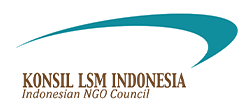By. Konsil LSM Indonesia
For many people introducing and discussing Business and Human Rights (BHR) Issues in Micro, Small and Medium Enterprises (MSMEs) is a challenge due to the enterprises perceived lack of capacity and capability. This perception stems from the context of UNGPs, having focused on big companies’ responsibility for causing social and ecological disasters in the past. However, big companies only comprise 0.01% of the total business units in Indonesia. Around 99.99% are MSMEs, with approximately 57% of the workforce employed in MSMEs. Furthermore, when the Global Economic Crisis hit Indonesia, these MSMEs became a strong pillar for stabilizing Indonesia’s economy, as MSMEs are a vital part of the supply chain for big business. Therefore it is essential to discuss Business and Human Rights in Micro, Small and Medium Enterprises.
For around one year Konsil LSM, supported by ICCO Cooperation has strengthened CSO coalitions to advocate for responsible business implementation in Indonesia. As an umbrella organization, Konsil LSM has 108 NGO members, with almost 50% of these assisting MSMEs. Konsil LSM has chosen this group as the final target for our advocacy work. To reach these goals, Konsil LSM has held lobbies, public dialogues with the government (Kemenlu, Kemenkop-UKM, and Focal Point for UNGPs), business associations (KADIN, APINDO, GAPKI), and the MSMEs themselves at national and provincial levels. Konsil LSM also provided two pieces of training on UNGPs on BHR. The practice was to strengthen the capacity of NGOs as coalitions members, to advocate BHR Issues to policy makers and also to the MSMEs.
As a result, there was an increase of public interest in the issue, including among the NGOs activists who strongly advocate BHR. They were very enthusiastic about the international instrument because it is an advocacy tool they can utilize. In 2 provinces, Southeast Sulawesi and West Sumatra when the coalition members (ALPEN Sultra and KPMM Padang) held radio and TV talk shows, many spectators and listeners interacted. Most of them were unfamiliar with BHR Issues, so it was new knowledge for them. After these positive experiences, the shows were increased in intensity from two to five times.
At the National level, Konsil LSM and the Coalitions were given more opportunities to be involved in the Formulating Guidelines for UNGP Implementation in Indonesia coordinated by Kemenlu. This opportunity was strengthened after the discussion held by Konsil LSM and the Coalition in July with government representatives from Kemenlu, Kemenkop-UKM, and UNGP on BHR Focal Points. The draft on UNGP for MSMEs is being formulated by the Coalition and will be discussed with Kemenlu by the end of August. They plan to launch the guidelines by the end of this year. Furthermore, Kemenkop-UKM has committed to be involved in the formulation of the Practical guide on BHR for MSMEs.
The local government in 2 provinces did not show interest in this issue. This reaction is influenced by the absence of national regulation on BHR, even stated in the new HR NAP (2018), and their lack of understanding on this issue. Although Konsil LSM is still in the very first steps, introducing UNGPs on BHR to the local government has gone well because they were open to the discussion. The Local Office such as Dinas Koperasi-UKM, Dinas Perindustrian, and Dinas Ketanagakerjaan in 2 provinces accepted the coalition team visits to their office.
Furthermore, to reach out to the MSMEs and educate them about the UNGPs on BHR, Konsil LSM provided two pieces of training on UNGPs on BHR issue and Monitoring the Implementation of the BHR issue in business operation. The training was attended by NGO activists from the coalition of 15 NGOs, not only from Jakarta, West Sumatra, and Southeast Sulawesi, but also has been expanded to Riau, East Java, West Kalimantan, and Yogyakarta regions. These organizations assist the MSMEs rights to improve their capacity, and some of them have been advocating individual cases related to the BHR issue in their fields.
The efforts of Konsil LSM are still at the very beginning of the process, and there has been no change to policy thus far. However, the issues of BHR in MSMEs have been widely discussed by many stakeholders, including governments, business associations, and the MSMEs themselves. BHR remains an important issue, as MSMEs are the largest group of Indonesian businesses.








